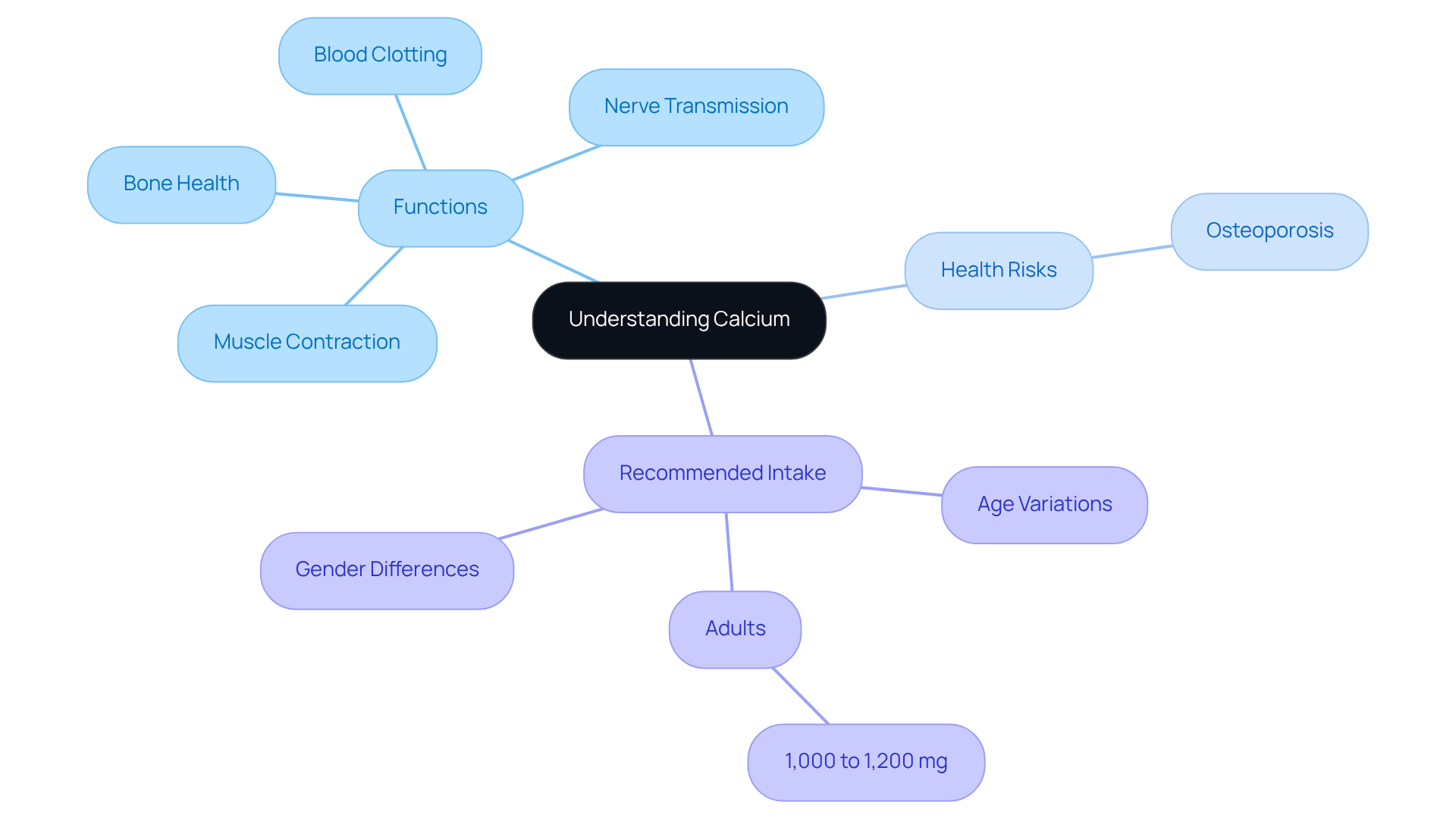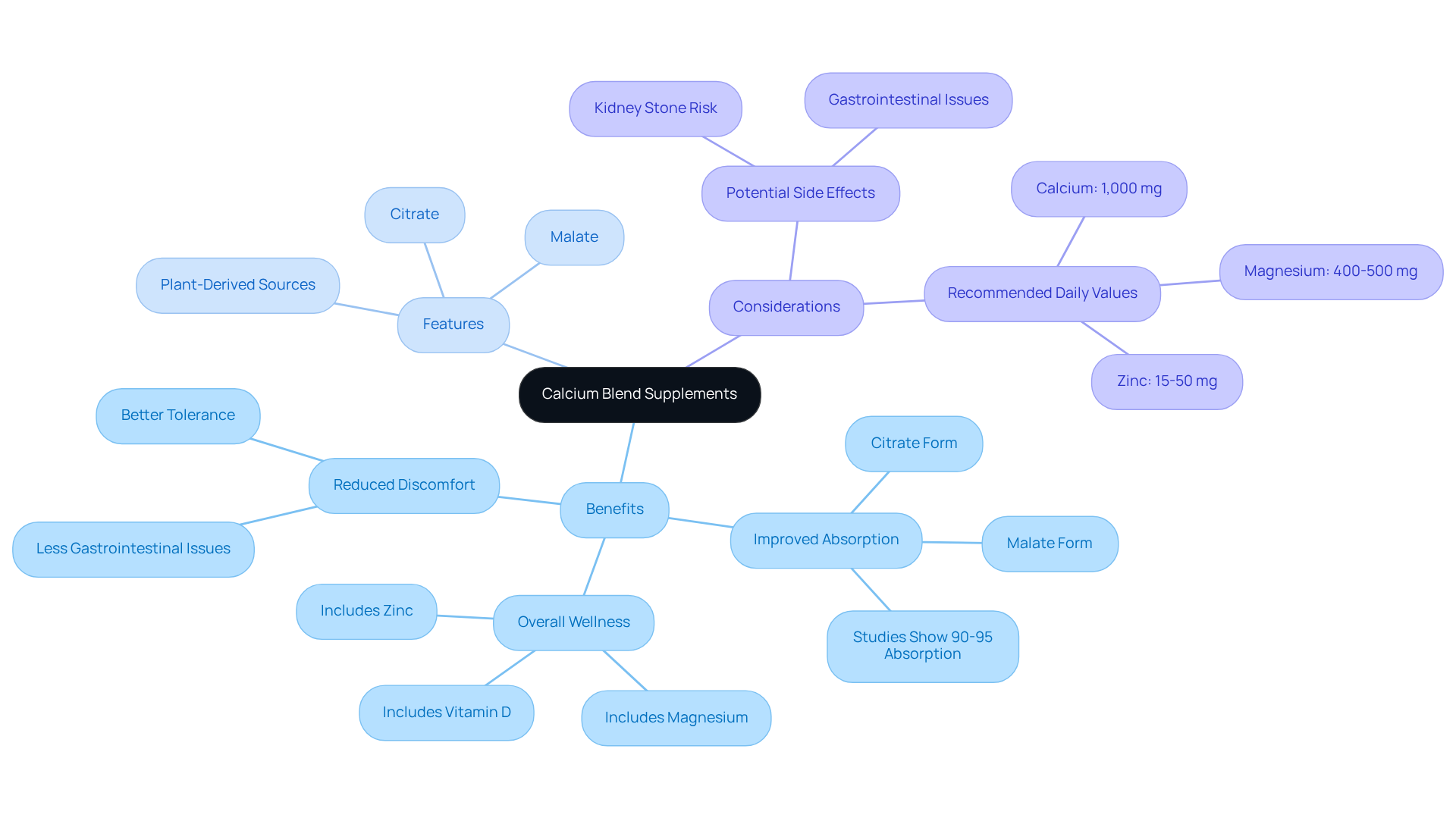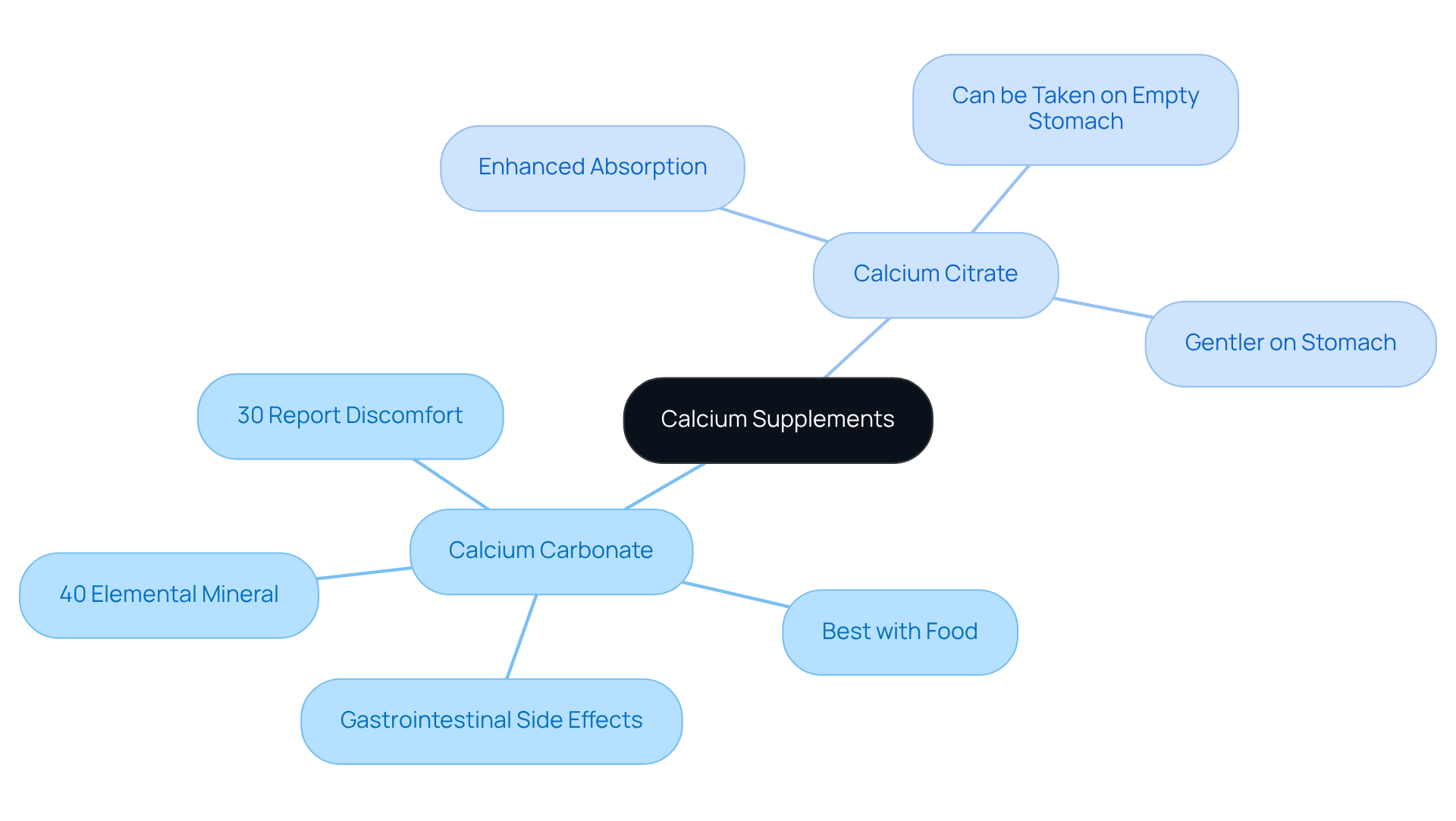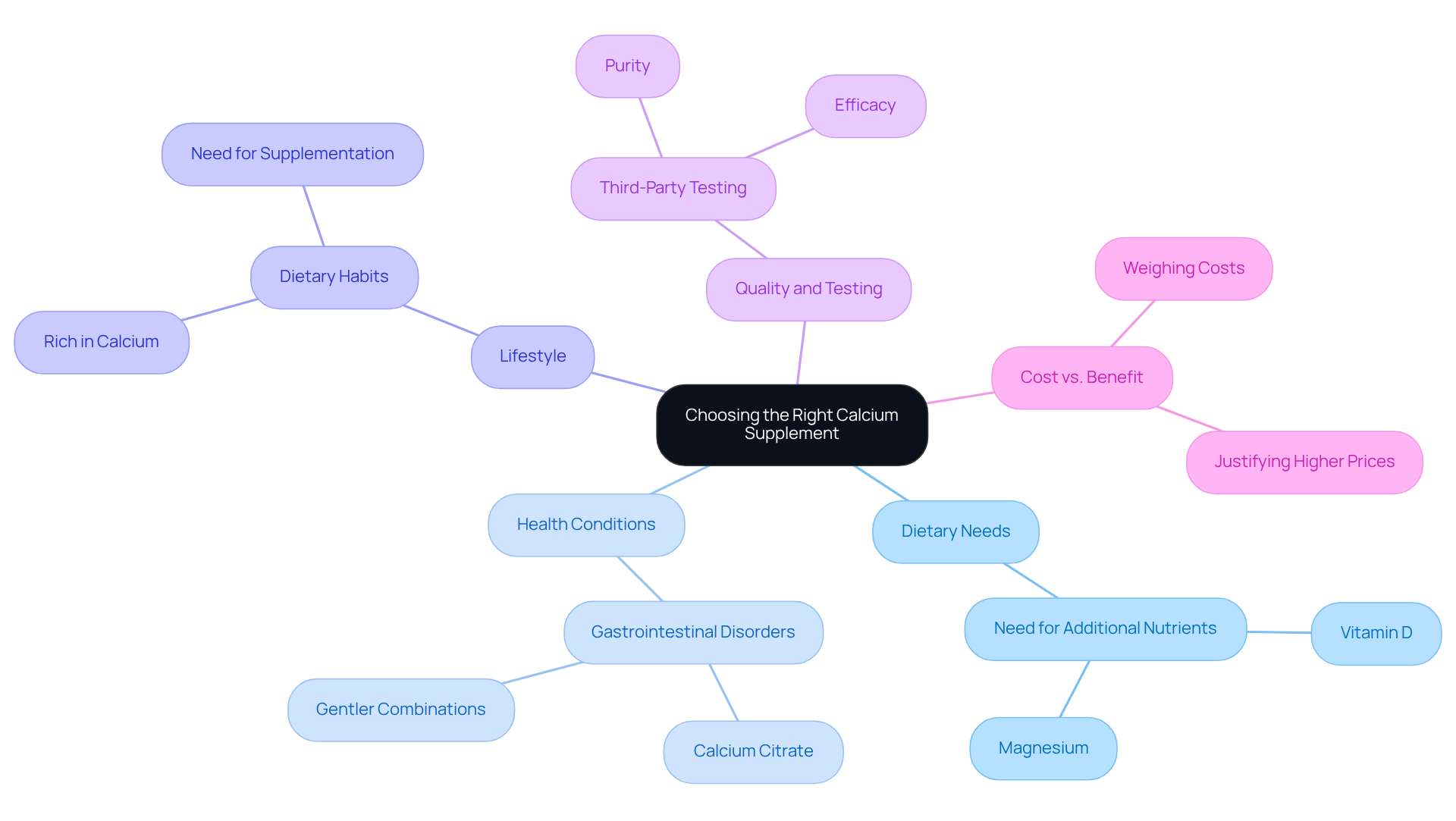Introduction
Choosing the right calcium supplement can feel like navigating a maze, and you’re not alone in this journey. With so many options available today, it’s completely understandable to feel overwhelmed. As health-conscious individuals like you seek to bolster your bone health, it’s crucial to grasp the differences between calcium blends and traditional supplements.
In this article, we’ll explore the benefits and drawbacks of each option, addressing your questions about:
- Absorption rates
- Nutrient composition
- Potential side effects
We understand that with so much at stake, determining which choice truly supports your health goals can be daunting.
Let’s take this journey together, ensuring you feel informed and empowered to make the best decision for your well-being.
Understanding Calcium: Essential Nutrient for Health
A calcium blend is a vital mineral that plays a crucial role in various bodily functions, particularly in maintaining strong bones and teeth. We understand that many people may not realize just how essential a calcium blend is for muscle contraction, nerve transmission, and blood clotting. As we grow older, our bodies need a regular intake of this mineral to support these important functions.
Inadequate intake of a calcium blend can lead to health problems like osteoporosis, which increases the risk of fractures. You’re not alone in this journey; many face challenges in meeting their nutritional needs. The recommended daily intake (RDA) for a calcium blend varies by age and gender, with adults generally needing between 1,000 to 1,200 mg each day.
Comprehending these needs is crucial for making informed choices about mineral supplementation. Remember, ensuring you have a proper calcium blend in your diet is a step towards a healthier future. Let’s prioritize our health together!

Exploring Calcium Blend Supplements: Benefits and Features
We understand that navigating the world of supplements can be overwhelming, especially when it comes to ensuring you’re getting the right nutrients for your bone health. A calcium blend often incorporates various forms of this essential mineral, such as citrate, malate, and even plant-derived sources, all aimed at improving absorption and effectiveness.
These mixtures often contain a calcium blend along with extra nutrients like vitamin D, magnesium, and zinc, which work together to promote not just bone health but overall wellness. For instance, citrate is particularly recognized for its exceptional absorption, especially for those who may have reduced stomach acid levels. Studies have shown that these mixtures can achieve absorption rates of 90-95%, which is significantly higher than conventional types. This makes them an appealing option for anyone looking for effective supplementation without the discomfort that sometimes accompanies it.
The recommended daily value of calcium is 1,000 mg, underscoring the importance of adequate intake for maintaining strong bones. Moreover, research suggests that a calcium blend incorporating citrate may be absorbed or tolerated better than calcium carbonate, making these mixtures a more attractive choice for many.
However, it’s essential to be mindful of potential side effects associated with mineral supplementation, such as gastrointestinal issues. You’re not alone in this journey; many people share similar concerns. Furthermore, citrate malate (CCM) offers unique advantages, including improved solubility and absorption, making it a beneficial option for those aiming to maximize their mineral intake. Remember, taking care of your health is a journey, and finding the right supplements can make all the difference.

Traditional Calcium Supplements: Types and Advantages
When it comes to choosing a calcium blend for supplements, we understand that the options can feel overwhelming. Supplements rich in this essential mineral generally fall into two categories: carbonate and citrate.
-
Calcium carbonate is the most common and economical option, containing about 40% elemental mineral.
- It works best when taken with food, which can enhance its effectiveness.
- However, you’re not alone if you’ve experienced gastrointestinal side effects, like constipation, which can make consistent use challenging.
- In fact, studies show that up to 30% of users report discomfort when using carbonate.
-
On the other hand, citrate offers a different experience.
- It allows for enhanced absorption and can be taken on an empty stomach, making it a great choice for those with sensitive digestive systems.
- Health experts often recommend a calcium blend, particularly citrate, for individuals who have faced side effects from carbonate, as it tends to be gentler on the stomach.
While both types of supplements are effective, their absorption rates can vary significantly, typically ranging from 20% to 40%. This variability can impact how well your body absorbs the mineral, highlighting the importance of selecting the right form based on your health needs and digestive comfort.
Many patients who switch from carbonate to citrate report feeling better and sticking to their supplementation routine more easily. Remember, you’re not alone in this journey, and finding the right supplement can make all the difference in your health and well-being.

Calcium Blend vs. Traditional Supplements: A Comparative Analysis
When it comes to choosing between traditional options and calcium blend supplements, we understand that many factors can weigh heavily on your mind. Let’s explore some of these together, so you can make the best choice for your health.
-
Absorption Rates: Did you know that calcium blends typically boast absorption rates of 90-95%? That’s significantly higher than the 20-40% seen with traditional supplements. This enhanced absorption of the calcium blend is especially beneficial for older adults or those with digestive issues, ensuring you receive the maximum benefit from your supplementation.
-
Nutrient Composition: Many calcium formulations come packed with extra vitamins and minerals, like vitamin D and magnesium, which are crucial for calcium metabolism and overall well-being. This collaborative approach not only promotes bone health but also enhances the effectiveness of minerals in your body.
-
Cost Considerations: While conventional calcium products, particularly calcium carbonate, might be easier on your wallet, it’s worth considering the long-term health benefits of a calcium blend. The cost-effectiveness of these mixtures, particularly the calcium blend, can be evaluated against their improved absorption and additional nutrients, which may ultimately save you money on health issues down the line.
-
Side Effects: We know that conventional mineral supplements can sometimes lead to gastrointestinal discomfort, such as constipation and bloating, especially with carbonate. In contrast, many formulations of calcium blend are designed to minimize these side effects, making them a more tolerable option for those sensitive to traditional formulations.
-
Caution in Supplementation: It’s important to approach mineral supplementation with care, particularly for individuals at risk of cardiovascular diseases. Some research suggests that high levels of calcium consumption might increase the likelihood of cardiovascular incidents, so it’s essential to evaluate your personal health situation thoughtfully.
-
Long-term Effects: The ongoing conversation about the lasting impacts of mineral supplementation on health highlights the need for further investigation. While adequate intake of calcium is vital for bone health, the implications of high supplemental doses remain uncertain.
-
Kidney Stone Formation: The relationship between mineral intake and kidney stone development is complex and varies by source. Increased intake of calcium has been associated with a higher risk of kidney stones, which is something to keep in mind when selecting a product.
Ultimately, the choice between mineral blends and conventional products should reflect your personal wellness needs, dietary restrictions, and budget. Remember, you’re not alone in this journey; understanding these factors can empower you to make informed choices that align with your health goals.

Choosing the Right Calcium Supplement: Considerations for Health-Conscious Individuals
When it comes to choosing a calcium blend supplement, we understand that the process can feel overwhelming. You’re not alone in this journey, and considering a few key factors can make all the difference in finding the right fit for your health needs.
-
Dietary Needs: Have you thought about whether you need extra nutrients alongside calcium? Nutrients like vitamin D or magnesium can enhance absorption and support your bone health.
-
Health Conditions: If you have specific health issues, such as gastrointestinal disorders, you might find that calcium citrate or certain combinations are gentler on your stomach.
-
Lifestyle: Reflect on your dietary habits. If your diet is already rich in calcium, you may not need as much supplementation.
-
Quality and Testing: It’s essential to look for products that have undergone third-party testing for purity and efficacy. This ensures you’re getting a high-quality item that you can trust.
-
Cost vs. Benefit: Weigh the cost of the product against its benefits. Sometimes, a more expensive blend may offer advantages that justify the price.
By taking these considerations into account, you can choose a calcium blend supplement that truly fits your health needs and lifestyle. Remember, making informed choices is a step toward better health!

Conclusion
Choosing the right calcium supplement is essential for maintaining optimal health, especially when considering the differences between calcium blends and traditional options. We understand that navigating these choices can feel overwhelming, but recognizing these differences is key to making informed decisions that truly align with your health needs and lifestyle.
Throughout this discussion, we’ve highlighted some important points. For instance, calcium blends often offer superior absorption rates, and they come with added nutrients that can enhance your overall well-being. On the other hand, traditional supplements may lead to gastrointestinal side effects for some individuals. It’s crucial to evaluate your personal dietary needs, health conditions, and the quality of the supplements you choose. Each of these factors plays a vital role in determining which option may be the most effective and beneficial for you.
Ultimately, prioritizing calcium intake is vital for your overall health, particularly in preventing conditions such as osteoporosis. As you explore your options, remember to consider not just the immediate effects of supplementation but also the long-term implications for your health. Making informed choices today can lead to a healthier tomorrow, ensuring that your body receives the essential nutrients it needs to thrive. You’re not alone in this journey; we’re here to support you every step of the way.
Frequently Asked Questions
What is the role of calcium in the body?
Calcium is a vital mineral that plays a crucial role in maintaining strong bones and teeth, as well as supporting muscle contraction, nerve transmission, and blood clotting.
What can happen if I do not get enough calcium?
Inadequate intake of calcium can lead to health problems such as osteoporosis, which increases the risk of fractures.
What is the recommended daily intake of calcium?
The recommended daily intake (RDA) for calcium varies by age and gender, but adults generally need between 1,000 to 1,200 mg each day.
What are calcium blend supplements?
Calcium blend supplements often incorporate various forms of calcium, such as citrate and malate, as well as plant-derived sources, aimed at improving absorption and effectiveness.
What additional nutrients are commonly found in calcium blend supplements?
Calcium blend supplements may also contain extra nutrients like vitamin D, magnesium, and zinc, which promote bone health and overall wellness.
Why is calcium citrate considered beneficial?
Calcium citrate is recognized for its exceptional absorption, especially for individuals with reduced stomach acid levels, achieving absorption rates of 90-95%, which is significantly higher than conventional types.
Are there any potential side effects of calcium supplements?
Yes, potential side effects associated with mineral supplementation can include gastrointestinal issues.
What is citrate malate, and why is it advantageous?
Citrate malate (CCM) offers unique advantages such as improved solubility and absorption, making it a beneficial option for those aiming to maximize their mineral intake.


